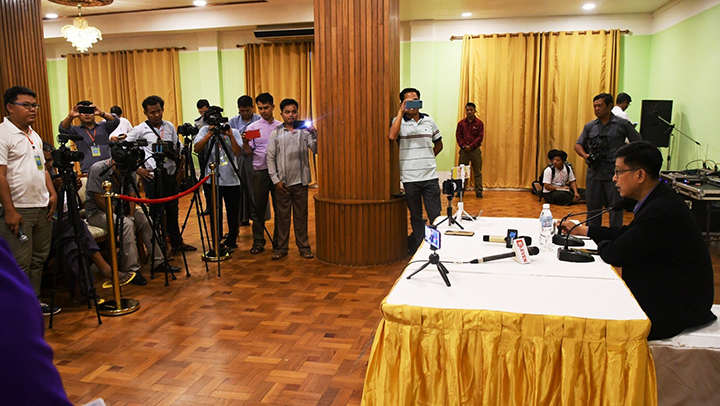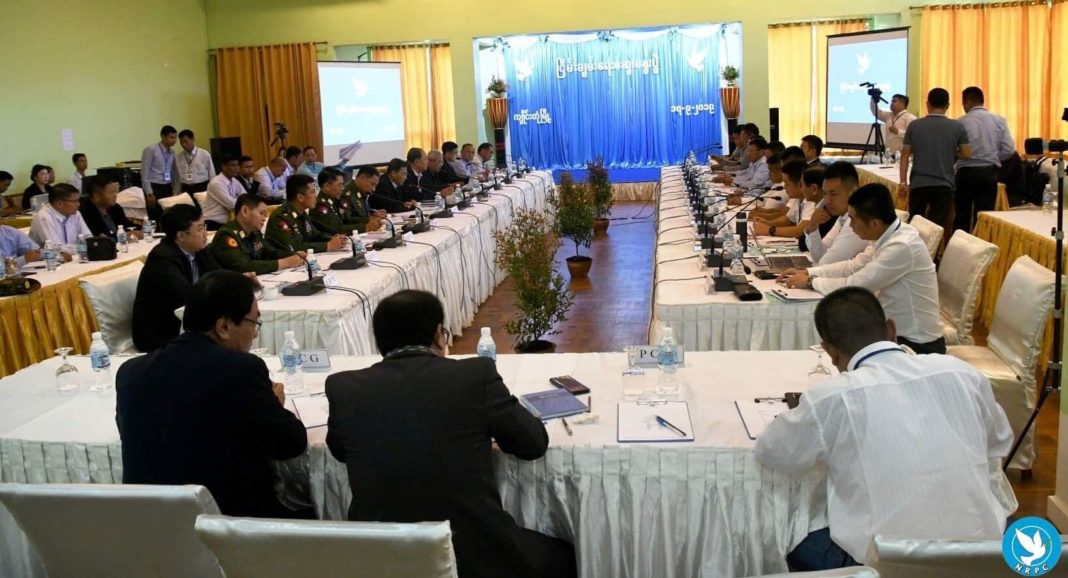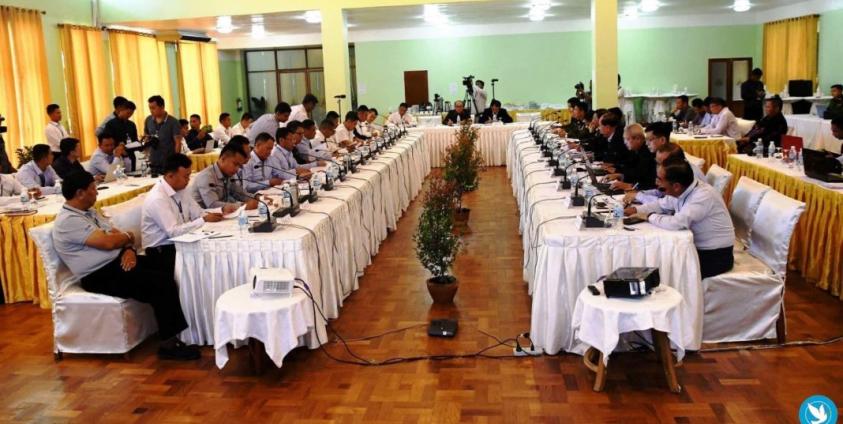On September 17, the Northern Alliance – Burma (NA-B) and the National Reconciliation and Peace Center (NRPC), which included the military or Tatmadaw representatives, met again in Kengtung for bilateral ceasefire possibility for the second time in Amazing Kengtung Resort Hotel for nearly the whole day.
A seven-point meeting record was compiled which includes: to work for speedy bilateral ceasefire; to de-escalate the ongoing armed conflict; the repatriation of internally displaced person (IDP); demarcation lines of the troops; to avoid reoccurring of armed conflict; to speedily sign the Nationwide Ceasefire Agreement (NCA); and to meet again in October for further negotiation.
The government side was participated by the NRPC Vice-Chairman Tun Tun Oo, who is also the Union attorney-general; President’s Office Director Zaw Htay; Lieutenant General Yar Pyae from the Office of the Commander-in-Chief (Army); and Peace Commission (PC) Vice-Chairman Thein Zaw and Secretary Khin Zaw Oo, a retired military officer.
Representatives of the NA-B were the Kachin Independence Organization (KIO) led by General Secretary Kum Htet Hting Nan; Ta’ang National Liberation Army (TNLA) by General Secretary Brigadier-General Tar Phone Kyaw; Arakan Army (AA) by General Secretary Brigadier-Genneral Dr Nyo Tun Aung; and Myanmar National Democratic Alliance Army (MNDAA) by Deputy Commander-in-Chief Yan Wenzhou.
While the meeting wasn’t unable to produce bilateral ceasefire agreement both the adversary blocs were keen to portray it as constructive and even said that it is good and satisfactory.
For example, Zaw Htay, director general of the president’s office, said the ceasefire agreement could not be signed as the alliance representatives did not have a mandate from all its members to sign a deal. He said as the NA-B didn’t have a mandate, it was agreed to be recorded in the meeting minutes, according to the Myanmar Times.

Photo: MNA / State Counsellor Office’s Director-General U Zaw Htay gives the press conference to local and foreign media in Kengtung, Shan State.
“The government was prepared to sign a ceasefire agreement at the negotiations. We were even willing to spend a night in Kyaingtong (Kengtung) so the alliance negotiators could return to Mine Lar (Mongla) to report to their superiors,” he said.
In the same vein, “It yielded good results. We agreed on some procedures to sign agreements, which could stop the fighting,” said TNLA General Secretary Tar Bone Kyaw.
However, AA second in command Dr. Nyo Twan Aung told the reporters after the talks, “I’m energized by the meeting. But it is more (an exercise) of filling in a blank space.” Based on this the success of the talks could be measured with how much trust can be built among the negotiators, he said.
He elaborated to the BBC in the latest interview on September 19, that AA generally negotiates with the NRPC and until the latest meeting on September 17 the Tatmadaw leaders have never participated.
He said: “This time the involvement of the military representatives could be positively viewed as a progress. Now is the time of bilateral negotiation. At this juncture, the situation is as we cannot say that they don’t want peace, the also cannot say that we don’t want peace.”

facebook.com/nrpc.myanmar/ : NRPC holds peace dialogue with ethnic armed groups in Kengtung 17 Sep, 2019
“This time the Kengtung meeting if we use the game plan vocabulary, it is level two and the start of being elevated to the next stage. In football language, the situation is after the whistle blowing and the start of the game, the two sides are observing each other,” he added to portray the existing condition in the aftermath of the Kengtung meeting.
In between, with the Tatmadaw unilateral ceasefire announcement expired today on September 21, the Three Brotherhood Alliance, AA, MNDAA and TNLA, issued a statement on September 20 extending their unilateral ceasefire until the December 31, even before ending its first unilateral ceasefire which will end on October 8.
The statement said that in order to be able to be conducive in striving for bilateral ceasefire and to de-escalate the ongoing armed conflict it has undertaken the declaration of the unilateral ceasefire until the end of the year. It further stated that if the Tatmadaw is willing, it is ready for a joint-ceasefire agreement.
But the last paragraph said if the Tatmadaw launches offensives and blocks humanitarian aids of the IDP, the Three Brotherhood Alliance will defend itself and the people.
Quite recently, Presidential Office Director Zaw Htay said that the government, parliament and the Tatmadaw have a 62-point agreed principles on how federalism could be established, to dispel accusation that there is no common agenda among the three institutions, and even an agreed road-map on peace negotiation process beyond the 2020 national election.
Push and pull
But the push and pull of the Tatmadaw and the mixed signals that it is sending confused a lot of people, including stakeholders and observers.
For examples, Commander-in-Chief Min Aung Hlaing has been engaged in a charm offensives since August visiting and donating cash and basic necessities to Hindu, Muslim and Buddhist religious communities. Obviously to show that he is for religious harmony to counter the accusation of being playing the card of ultra-nationalism.
In the meantime, the 25% appointed Tatmadaw MPs in the parliament, together with Union Solidarity and Development Party (USDP), are on the constitutional amendment spree, such as expanding the paragraph 59 (f) that would ban anyone with a foreign spouse and children to take up presidential and other union minister portfolios. A move which many believed is aimed at prohibition of National League for Democracy (NLD) leader Aung San Suu Kyi to take up the said positions.
And quite recently, the Tatmadaw again proposed an amendment to breath in life and empower the National Defense and Security Council (NDSC), which State Counselor Aung San Suu Kyi has so far ignored and refused to call even a single meeting of the group.
The NDSC is an eleven-member national security council responsible for security and defense affairs in Myanmar. NDSC serves as the highest authority in the Government of Myanmar, as an executive body that has disproportionate membership consisting of more Tatmadaw members. Of the 11 members, the commander-in-chief appointed 5 members and controls 6 votes.
Outlook and perspectives
Given such unfolding political scenarios, aside from its political rivalry with the NLD, it is hard to predict if the Tatmadaw is really keen to offer an olive branch to the Three Brotherhood Alliance, as the war in northern Shan and Rakhine States still cannot be stopped and in fact still raging on quite fiercely, as of this writing.
Many suspect that the logic for the Tatmadaw has been to keep the war flames on to demonstrate its influence and importance in having a say politically in running the country. Thus, it is being accused that its unilateral ceasefire is deliberately designed not to cover the Arakan or Rakhine State; and despite unilateral ceasefire declaration the offensives in northern Shan State have been ongoing and never really ceased.
But as the Three Brotherhood Alliance attacks of Pyin Oo Lwin military facilities and other four targets in Nongkhio Township showed how the trade route from Mandalay to Muse connecting China, which generates 75% of the country’s trade volume, could easily be disrupted, not to mention the casualties of the army, police and civilian of more than a dozen.
Because of this high economic and human cost, the Tatmadaw should set aside its strategy behind the strategy of keeping the war flames and abandoned it, while asserting more energy to achieve the bilateral ceasefire with the NA-B.
Besides, the political ambition of the commander-in-chief with an eye on the presidential post, which many suspect to be unraveling with his now ongoing charm offensives; and the Tatmadaw’s aim to again rule the country in collaboration of the USDP as a military bloc, will be better served contesting the 2020 election in a peaceful atmosphere than with the civil war going on.
In other words, a semblance of level playing field, rather than an outright lopsided one using the war flames on policy and a mild threat of military coup, will serve all the contending parties and the country better, if democratization is still the norms.
The Tatmadaw should now be more mature and supportive in trying to secure a bilateral ceasefire deal for the betterment of country, if not for anything else.






